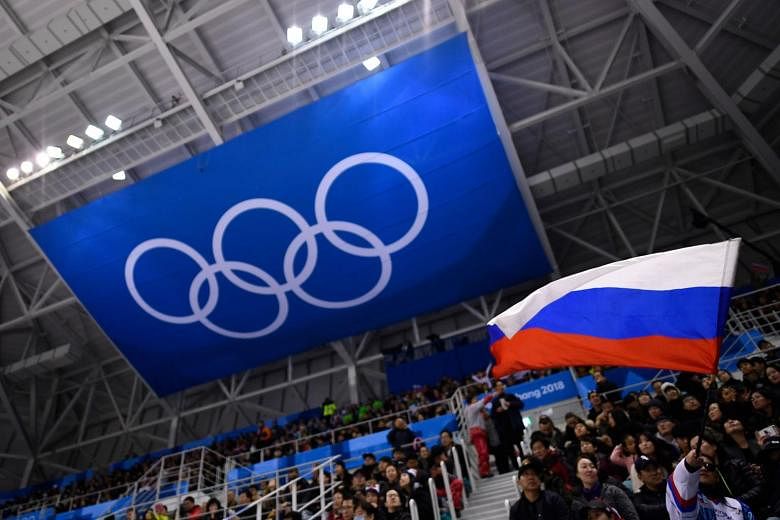LOS ANGELES (AFP, REUTERS) - The Court of Arbitration for Sport's (CAS) decision to halve Russia's doping ban on Thursday (Dec 17) has been decried as a "tragedy" for the global fight against drug cheats by several bodies.
Leading the criticism was United States Anti-Doping Agency (Usada) chief executive Travis Tygart, who said the CAS decision - which cut Russia's proposed four-year ban to two years - represented a "significant loss" for the World Anti-Doping Agency (Wada) and clean athletes.
He added: "While the first instinct is to express obvious shock, the fact is we should have all seen this coming. Wada and the IOC (International Olympic Committee) have manipulated and mishandled this sordid Russian state-doping affair from day one and have put politics over principle once again."
The two-year sanction bars Russia from sending an official delegation to the rearranged 2021 Tokyo Olympics, the 2022 Winter Olympics and football's 2022 World Cup but allows Russian athletes to compete in those events under a neutral banner. The athletes would still be able to compete in uniforms in Russian colours with the word "Russia" on them, and Russian government officials could still attend the Games if invited by host nations.
Similar rules were in effect for Russian athletes at the 2018 Pyeongchang Winter Olympics.
Tygart was not alone in being upset.
Global Athlete and The Athletics Association said: "The fact that Russian athletes can complete as 'Neutral Athletes from Russia' is another farcical facade that makes a mockery of the system.
"If athletes from Russia can still compete, it is not a sanction. Russia has not been banned; they have simply been rebranded."
British Paralympic silver medallist Ali Jawad added: "The events of the last five years, the lack of athlete voices, and the constant compromise with Russia has made me realise that Wada is not fit for purpose."
'So many loopholes'
"It's riddled with so many loopholes," Tygart said. "IOC members are exempt from the ban. Athlete support personnel and government officials are exempt from it. There's no consequence on those folks even if they were involved with directly perpetrating fraud in the past."
Wada had imposed a four-year ban on Russia after finding that Moscow had manipulated evidence from a laboratory database handed over to investigators probing the long-running doping scandal.
Tygart said that attempt to alter evidence showed Russia had not been deterred by earlier sanctions.
"They've been given chance after chance after chance," he said. "Pyeongchang didn't change their behaviour and we know that because they manipulated the database after that. So to be given yet another weak and loophole-riddled outcome is just a tragedy for the overall global effort."
He also questioned the ability of authorities to monitor Russian athletes allowed to compete at the Olympics under a neutral banner.
"We don't know anything about what the testing requirements for any athletes from Russia who do compete in Tokyo are going to be," he said.
"There is a lack of transparency and unwillingness to create a standard that would hold them accountable.
"We put our individual test histories on our website. So you can go and see how many times (US swimmer) Katie Ledecky has been tested by us. The world's not going to get any of that information from Russia if the status quo remains."
'A victory for Russia'
Speaking to reporters on Thursday, the Russian Olympic Committee's president Stanislav Pozdnyakov expressed satisfaction that the CAS had not "collectively" banned Russia's athletes.
Mikhail Bukhanov, acting head of the country's anti-doping agency Rusada, said: "Today's results are a victory for Russia."
"The court decided not to accept the theses that Wada demanded. Of course, this is a significant precedent," he added.
However, he blasted as "unacceptable" the CAS' decision to ban Russia's high-ranking officials, including the country's president Vladimir Putin, from attending the Games.
The president of the Russian swimming federation, Vladimir Salnikov, said he had expected "an even worse scenario". "Nevertheless, it is really very sad," he added, promising if necessary to defend "by legal means" athletes deprived of the right to participate in the Olympics.

